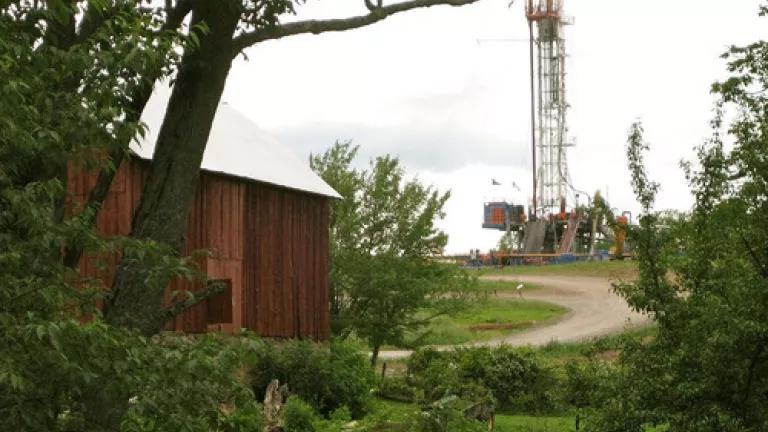Obama Administration Must Say No to Industry Loopholes in Natural Gas Fracking Standards

Natural gas development is spreading like wildfire across the country. Energy companies have drilled more than 75,000 wells in the past five years, many of them on farmlands, near public schools, and in people’s backyards. These wells release benzene and other chemicals known to cause cancer. Yet energy companies aren’t obligated to clean up any of the pollution they put into the air we breathe.
The Obama administration is poised to change that.
It is about to establish the first-ever national limits on air pollution coming from natural gas wells, especially from wells that are fracked. This would be a major first step in protecting public health and create real improvements for families living in the midst of natural gas fields.
But the oil and gas industry is clamoring for loopholes in these safeguards—loopholes that would make it easy for them to continue polluting. NRDC has fought hard for strong air standards, and we will be watching to make sure the safeguards issued next week are not watered down with industry-friendly exemptions.
Now is the time to hold energy companies accountable for the pollution they create. For far too long, they have run roughshod over the health and well being of American communities and ordinary people are paying the price.
A new study by researchers from the Colorado School of Public Health found that air pollution from natural gas fracking sites increased the risk of significant health problems for people living near drill pads. The toxins detected in the air included natural-gas-related chemicals linked to headaches, asthma symptoms, childhood leukemia, and other cancers. The dangers increased for people living within a half-mile of natural gas drill pads, yet Colorado lets companies sink wells up to 150 feet of people’s homes.
People living near wells have told me they are afraid to let their children play outside. Others have described strong chemical odors coming from drill pads and reported fumes that have left them with burning noses, heart palpitations, and headaches. No one wants to deal with these threats in their own homes and backyards.
The good news is that proven solutions exist to reduce the pollution coming from drill pads and other equipment. A large amount of pollution rushes out of a well in the first few days after a well has been fracked or refracked. Through a process called green completion, companies can capture the fumes in truck-mounted portable tanks, separate out the methane and other hydrocarbons—the main ingredients in natural gas—and sell them for a profit.
NRDC experts analyzed green completion and nine other pollution control measures and found them to be practical and profitable. In our new report, Leaking Profits, we show that if companies employed these solutions, they would keep hundreds of thousands of tons of dangerous contaminants out of the air and increase the gas industry’s profits by $2 billion a year.
Colorado and Wyoming have required green completion for several years and still those states have experienced enormous growth in natural gas drilling. Clearly standards to protect our health do not limit production.
And yet the industry is fighting tooth and nail to block or water down any national standards. The American Petroleum Institute and other lobbying groups have complained about the forthcoming limits on air pollution and have demanded broad exceptions that would render the limits nearly meaningless. But the API complaints are overblown and the industry can easily comply with the new rules. As my colleague David Doniger wrote in a recent post, the industry wants an exemption that swallows the rule.
The American people have grown tired of the industry’s refusal to clean up its mess. According to a survey by Bloomberg last month, over three times as many Americans say there should be more regulation of natural gas fracking.
The natural gas industry wants to position itself as a cleaner alternative to coal, but it will face new battles in each new community it enters unless it becomes a more responsible actor and embraces environmental and public health safeguards. It’s not enough to be a hair better than coal.
And the Obama administration must do its part by putting much stronger safeguards in place. The air pollution standards that we hope will be finalized next week are in important start. But we will continue to press for additional safeguards to better protect Americans from the toxic, smog-forming, and climate-changing pollution from oil and gas production.
In the meantime, we will monitor the April 17 release. We will welcome strong curbs on pollution from fracking and we will oppose any loopholes that make it easier for energy companies to dirty our air.
